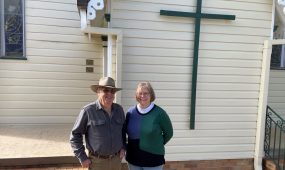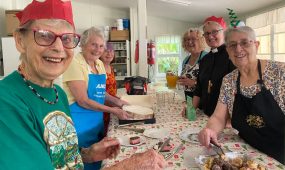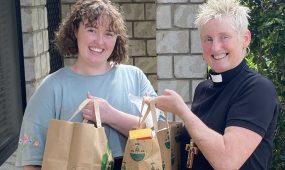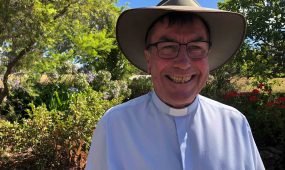Dispatch from a dusty new deacon
The Baru Beat
“What a wonderful beginning I am experiencing in my new deacon role. Conversations, especially incidental chats, have been a highlight of my ministry so far, as they teach me much about the unique blessings and challenges of rural life and foster a critical sense of belonging,” says BMF deacon The Rev’d Loretta Tyler-Moss from the Parish of Brisbane Valley
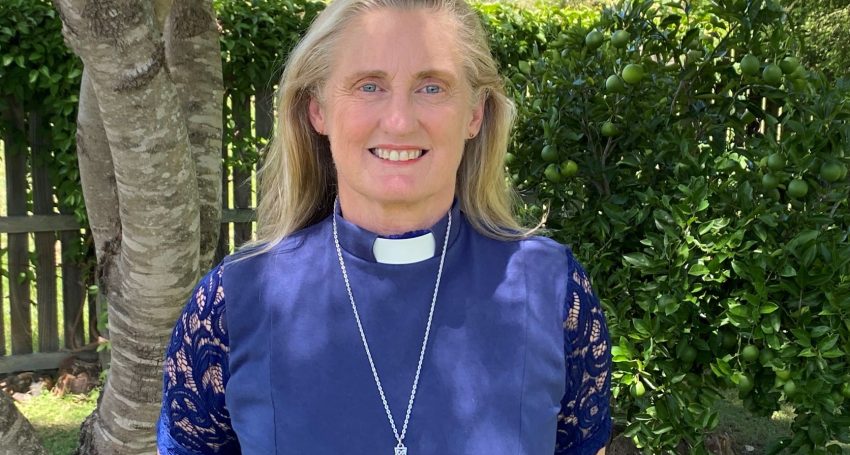
As a brand-new deacon I was incredibly excited to be offered the opportunity to begin my ministry in the Parish of Brisbane Valley, approximately 100km northwest of Brisbane. I am being supported in a part-time position by the parish, in conjunction with the Bush Ministry Fund (BMF). I have come to ministry as idealistic and hopeful as any newcomer.
What a wonderful beginning I am experiencing in my new deacon role. Conversations, especially incidental chats, have been a highlight of my ministry so far, as they teach me much about the unique blessings and challenges of rural life and foster a critical sense of belonging.
As part of an ongoing conversation with a volunteer rural firefighter, I asked about the Esk fire station to explore chaplaincy opportunities. I had no idea what an education my “simple” enquiry would bring. The fire station is unstaffed, with multiple volunteer Rural Fire Services (RFS) throughout the Brisbane Valley. Sadly, these are being impacted by the realities of an aging population and COVID-19 restrictions, which are leading to mergers. RFS volunteers are fiercely loyal to their local group, with many having served for decades in the one branch. Mergers are painful for volunteers, undermining their sense of community and of belonging. Such conversations often become less about friendly chit-chat and more pastoral in nature.
Last weekend a woman visited one of the parish centres for the first time to “check out” the new deacon. She is a Uniting Church goer married to an Anglican who is in palliative care. She came to the service to sound me out as a potential family minister. After the service she approached me to talk about her husband and family. I will be visiting her in her home soon and I look forward to meeting her husband.
Advertisement
Volunteering with Meals on Wheels (MoW) and the local chaplaincy committee has revealed a deep integration of community groups with many faces quickly becoming familiar in a variety of settings. As a parish, we have multiple people serving on multiple committees around town. Meals on Wheels has also immediately opened the door to interdenominational relationships. At the first MoW meeting that I attended, introductions followed a pattern of “You remember X. She/he is with the [insert denomination name].” This is followed by a friendly reply along the lines of “Ah, yes, I met you at the street stall/chaplaincy meeting/Christmas tree.”
As the owner of a four-wheel drive, I have found myself on the “country run”, which includes bush tracks, very tall grass and “roads” that are barely so. Fortunately, I have been partnered with a long-term local on these rural rounds, as I am not entirely convinced that Google Maps is up to the navigation tasks.
My hopes of integrating church and community life are being realised. But, I am also quickly being brought up short by the practicalities of life outside of the city. Leaving it until Saturday afternoon to “pop down” to the pharmacy was a mistake I made only once. Similarly, the bank’s hours are not citified and ATMs are inside the local stores, so I need to plan ahead to get cash out.
Advertisement
To be honest, the Brisbane Valley is so close to both Brisbane and Ipswich that I feared that I wasn’t really going to be “serving in the country”. The gentle culture of life here proved that fear inaccurate, but the reality of significant service gaps confirms that we are indeed living outside of the city – these gaps go beyond limited business and bank hours.
Such gaps are significant for locals. I have realised that the “Why don’t you just call/ask/request a service?” is an unhelpful question for me to ask. Conversations with locals about the COVID-19 hotline, My Aged Care and Centrelink commonly expose impractical assumptions about accessibility to facilities, services, personnel and transport.
Getting tested for COVID-19 has been even tougher for regional folk, with many a wry story told. When I ran into a parishioner at the local IGA, or “co-op” as the locals call it, he told me about his experience calling the COVID-19 helpline in order to clarify how to proceed in isolation when unable to access a RAT. The clearly city-based operator suggested that he go to a drive-through testing facility. The reply of “We don’t have one!” was met with confused silence followed by a suggestion that he make contact with another area of Queensland Health. Fortunately in the end, a local pharmacy was able to help out with an ad hoc RAT carpark pick-up.
The people of my parish and new community are gently, and with good humour, leading me forward. Granted it has only been a couple of months and I have much to learn.
This dusty new deacon is gratefully accepting the opportunity to be in the community, to listen attentively and to seek insight by walking quietly beside those who so are generously sharing their lives with me.
Editor’s note: The new Bush Ministry Fund money boxes are a fun and easy way for individuals, families, parishes and schools to donate to bush ministry in our Diocese. Order your BMF money box today by emailing Helen Briffa in the Western Region office via hbriffa@anglicanchurchsq.org.au or by calling 07 4639 1875.

